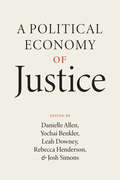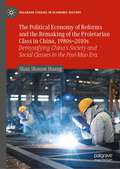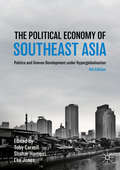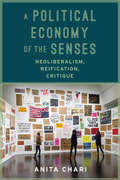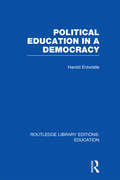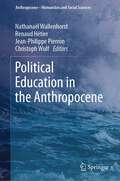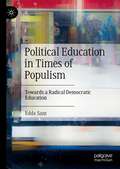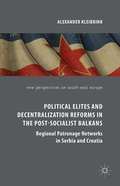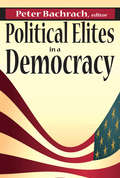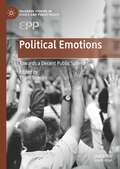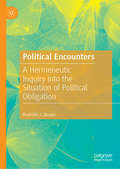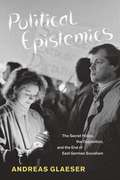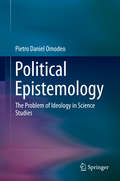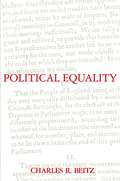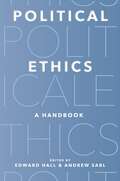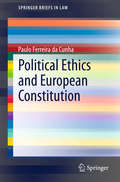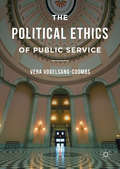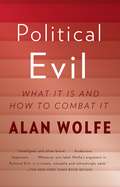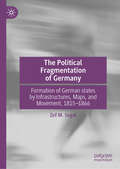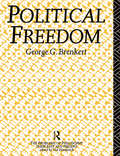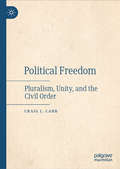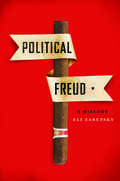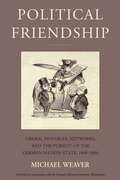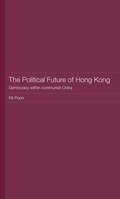- Table View
- List View
A Political Economy of Justice
by Leah DowneyDefining a just economy in a tenuous social-political time. If we can agree that our current social-political moment is tenuous and unsustainable—and indeed, that may be the only thing we can agree on right now—then how do markets, governments, and people interact in this next era of the world? A Political Economy of Justice considers the strained state of our political economy in terms of where it can go from here. The contributors to this timely and essential volume look squarely at how normative and positive questions about political economy interact with each other—and from that beginning, how to chart a way forward to a just economy. A Political Economy of Justice collects fourteen essays from prominent scholars across the social sciences, each writing in one of three lanes: the measures of a just political economy; the role of firms; and the roles of institutions and governments. The result is a wholly original and urgent new benchmark for the next stage of our democracy.
The Political Economy of Reforms and the Remaking of the Proletarian Class in China, 1980s–2010s: Demystifying China's Society and Social Classes in the Post-Mao Era (Palgrave Studies in Economic History)
by Shan Shanne HuangThis book comprehensively investigates the position of China’s working class between the 1980s and 2010s and considers the consequences of economic reforms in historical perspective. It argues the case that, far from the illusion during the Maoist period that a new society had been established where the working classes held greater political and economic autonomy, economic reforms in the post-Mao era have led to the return of traditional Marxist proletariats in China. The book demonstrates how the reforms of Deng Xiaoping have led to increased economic efficiency at the expense of economic equality through an extensive case study of an SOE (state-owned enterprise) in Sichuan Province as well as wider discussions of the emergence of state capitalism on both a micro and macroeconomic level. The book also discusses workers’ protests during these periods of economic reform to reflect the reformation of class consciousness in post-Mao China, drawing on Marx’s concept of a transition from a ‘class-in-itself' to a ‘class-for-itself’. It will be valuable reading for students and scholars of Chinese economic and social history, as well as political economy, sociology, and politics.
The Political Economy of Southeast Asia: Politics and Uneven Development under Hyperglobalisation (Studies in the Political Economy of Public Policy)
by Shahar Hameiri Lee Jones Toby Carroll"This is not only the best collection of essays on the political economy of Southeast Asia, but also, as a singular achievement of the “Murdoch School”, one of the rarest of books that demonstrates how knowledge production travels across generations, institutions and time periods, thereby continually enriching itself. No course on Southeast Asia can afford to miss it as its core text." (Professor Amitav Acharya, American University, USA) "This book – the fourth in a path-breaking series – demonstrates why a critical political economy approach is more crucial than ever for understanding Southeast Asia's transformation. Across a wide range of topics, the book explains how capitalist development and globalisation are reshaping the societies, economies and politics of a diverse group of countries, casting light on the deep sources of economic and social power in the region. This is a book that every student of Southeast Asia needs to read." (Professor Edward Aspinall, Australian National University, Australia) "This book does what a work on political economy should do: challenge existing paradigms in order to gain a deeper understanding of the processes of social transformation. This volume is distinctive in three ways. First, it eschews methodological nationalism and focuses on how the interaction of national, regional, and global forces are shaping and reshaping systems of governance, mass politics, economies, labor-capital relations, migration, and gender relations across the region. Second, it is a bold effort to show how the “Murdoch School,” which focuses on the dynamic synergy of internal class relations and global capitalism, provides a better explanatory framework for understanding social change in Southeast Asia than the rival “developmental state” and “historical institutionalist” approaches. Third, alongside established luminaries in the field, it showcases the younger generation of political economists doing pathbreaking work on different dimensions of the political economy of the region." (Walden Bello, State University of New York at Binghamton, USA, and Former Member of the Philippines’ House of Representatives) "This very timely fourth edition explores Southeast Asia’s political economy within the context of hyperglobalisation and China’s pronounced social-structural impacts on international politics, finance and economics over the past decade and a half. The volume successfully adopts a cross-cutting thematic approach, while also conveying the diversity and divergences among the Southeast Asian states and economies. This will be an important resource for scholars of International Relations and Comparative Politics, who need to take an interest in a dynamic and increasingly significant part of Asia." (Professor Evelyn Goh, Australian National University, Australia) “This ambitious collection takes a consistent theoretical approach and applies it to a thematic, comparative analysis across Southeast Asia. The yield is impressive: the social, political and economic forces constituting the current conjuncture are not simply invoked, they are thoroughly identified and explained. By posing the deceptively simple questions of what is happening and why, the authors demonstrate the reciprocal relation between theory-building and empirical inquiry, providing a model of engaged scholarship with global resonance. Bravo!" (Professor Tania Li, University of Toronto, Canada) "Counteracting the spaceless and flattened geography of much literature on uneven development, this book delivers a forensic examination of the unevenness of geographical development in Southeast Asia and the relations of force shaping capital, state, nature and civil society. This is the most compelling theoretical and empirical political economy book available on Southeast Asia." (Professor Adam David Morton, University of Sydney, Australia) "A vital book for all scholars, students and practitioners concerned with political economy and development, this volume combines cutting-edge theory with
A Political Economy of the Senses: Neoliberalism, Reification, Critique (New Directions in Critical Theory #2)
by Anita ChariAnita Chari revives the concept of reification from Marx and the Frankfurt School to spotlight the resistance to neoliberal capitalism now forming at the level of political economy and at the more sensate, experiential level of subjective transformation. Reading art by Oliver Ressler, Zanny Begg, Claire Fontaine, Jason Lazarus, and Mika Rottenberg, as well as the politics of Occupy Wall Street, Chari identifies practices through which artists and activists have challenged neoliberalism's social and political logics, exposing its inherent tensions and contradictions.
Political Education in a Democracy (Routledge Library Editions: Education)
by Harold EntwistleIn this volume the author analyzes the relationships of concepts such as socialization and political education, explains those aspects of the theory and practice of democracy that are especially relevant for schools, and suggests ways in which teachers can better provide for the political education of their students.
Political Education in the Anthropocene (Anthropocene – Humanities and Social Sciences)
by Nathanaël Wallenhorst Renaud Hétier Jean-Philippe Pierron Christoph WulfThis book articulates an educational theory as well as a political theory of the Anthropocene. Divided into three sections it addresses educational anthropology, cultures and institutions, and educational recommendations in the Anthropocene. Topics covered in the volume measure the impact of the idea of the Anthropocene on the type of anthropology that underlies education and on a phenomenology of relationship. It links the notion of the Anthropocene with cultures and institutions so as not to 'smooth out' or erase the latter. Finally, it presents proposals and recommendations for educational practices. The work advocates rethinking education as an essential component in ensuring the sustainability of human life in society - by proposing to go beyond the approach of education for sustainable development or environmental education. The work also brings together empirical contributions in which proposals are elaborated for programs, pedagogical devices and experiments relating to the preparation of the future in the field of education. This volume is of interest to researchers of the Anthropocene.
Political Education in Times of Populism: Towards a Radical Democratic Education
by Edda Sant"In professional and academic contexts nothing is more important than helping people to understand and engage with democratic society. Sant has written an excellent book which helps greatly towards that end. She has developed incisive new arguments about the nature of contemporary politics and education. Using the most recent as well as classic literature, she explores key ideas and issues. Through wide ranging discussions and by referring to her own valuable empirical work she characterizes and creates thoughtful insights and innovative pedagogical approaches. This book achieves the very difficult task of illuminating complex ideas at the same time as helping to determine practical ways to achieve social justice through education. Political education has been neglected for too long. This book is a bold new step in its achievement."—Ian Davies, Emeritus Professor, University of York, UKThis book examines political education in times of democratic crisis, polarisation and uncertainty. Using populism as a diagnostic tool, the book scrutinises current democratic practices and considers alternatives for future social studies and citizenship education. The author examines contemporary events including Brexit, the Catalan referendum for independence and protests in Chile to ask how democratic educators can respond to times of crisis. Centered on themes of knowledge and ideology, the book draws together political philosophy and educational research to map out, critically analyse and offer alternatives to dominant debates on political education. It will be of interest and value to scholars examining the relationship between democracy and educational theory and practice.Edda Sant is Senior Lecturer at Manchester Metropolitan University, UK. A former social studies teacher, her research interests lie in citizenship, political and democratic education. She has published widely in this field, and in 2016 was recognized with a Children’s Identity & Citizenship European Association Award.
Political Elites and Decentralization Reforms in the Post-Socialist Balkans: Regional Patronage Networks in Serbia and Croatia (New Perspectives on South-East Europe)
by Alexander KleibrinkAcross the globe, more powers are being devolved to local and regional levels of government. This book provides an innovative analysis of such decentralisation in transition states in the Balkans. Using new and rich data, it shows how political elites use decentralisation strategically to ensure their access to state resources.
Political Elites in a Democracy (Controversy Ser.)
by Peter BachrachOne of the potentially explosive issues of the modern era is a vast and growing disparity between the overwhelming predominance of elites in the decision-making process and the democratic ideal that people should participate in making decisions that vitally affect them. In this book an impressive array of political theorists offer conflicting views on the form of democratic elitism practiced in the United States.Defining the political elite as "the power holders of the body politic," Harold Lasswell explains that the division into elite and mass is universal, while Robert Dahl confirms that key political, economic, and social decisions are indeed made by these tiny minorities. Paul Good man argues that we are now in a period of excessive centralization that he regards as "economically inefficient, technologically unnecessary, and humanly damaging." From another standpoint, Herbert Marcuse calls for a struggle against the ideology of tolerance husbanded by the political elites in this country and Jack L. Walker contends that elitist theory has provided an unconvincing explanation of the widespread political apathy in American society.As the events of recent decades vividly demonstrate, a growing number of people refuse to recognize elite rule. This many-sided work puts before the student a variety of strongly held opinions regarding the place and function of the political elite and its power. The wide range of authoritative articles makes Political Elites in a Democracy a most useful addition to every course in political science that touches on the subject of elites and political power.
Political Emotions: Towards a Decent Public Sphere (Palgrave Studies in Ethics and Public Policy)
by Thom BrooksHow might political emotions contribute to the creation of a decent public sphere? Our societies are characterized by difference and contestation. Cultivating political emotions can appear counterproductive to stability and peace. But there is an increasing recognition that emotions can be harnessed to empower community cohesion and social justice – and new ideas about how our political emotions can foster a decent public sphere and overcome intolerance are urgently needed. In Political Emotions: Towards a Decent Public Sphere, leading theorists consider the limits and prospects of cultivating our emotions that support social justice. All examine this topic from a diversity of disciplinary perspectives breaking new ground and yielding new understandings. Issues explored include adaptive preferences, capabilities, civil religion, compassion, conscience, dignity, feminism, imagination, multicultural citizenship, perfectionism, political liberalism, public sentiments, sympathy and much more in a wide-ranging exploration of key themes in contemporary political philosophy – and Martha C. Nussbaum’s significant contributions to it in particular - that should be of interest to anyone working in these broad areas.
Political Emotions
by Martha C. NussbaumHow can we achieve and sustain a "decent" liberal society, one that aspires to justice and equal opportunity for all and inspires individuals to sacrifice for the common good? In this book, a continuation of her explorations of emotions and the nature of social justice, Martha Nussbaum makes the case for love. Amid the fears, resentments, and competitive concerns that are endemic even to good societies, public emotions rooted in love--in intense attachments to things outside our control--can foster commitment to shared goals and keep at bay the forces of disgust and envy. Great democratic leaders, including Abraham Lincoln, Mohandas Gandhi, and Martin Luther King Jr. , have understood the importance of cultivating emotions. But people attached to liberalism sometimes assume that a theory of public sentiments would run afoul of commitments to freedom and autonomy. Calling into question this perspective, Nussbaum investigates historical proposals for a public "civil religion" or "religion of humanity" by Jean-Jacques Rousseau, Auguste Comte, John Stuart Mill, and Rabindranath Tagore. She offers an account of how a decent society can use resources inherent in human psychology, while limiting the damage done by the darker side of our personalities. And finally she explores the cultivation of emotions that support justice in examples drawn from literature, song, political rhetoric, festivals, memorials, and even the design of public parks. "Love is what gives respect for humanity its life," Nussbaum writes, "making it more than a shell. " Political Emotions is a challenging and ambitious contribution to political philosophy.
Political Encounters: A Hermeneutic Inquiry into the Situation of Political Obligation
by Ruairidh J. BrownThis book takes the novel approach of framing Political Obligation as a situation rather than a problem. By doing so, Political Obligation is not considered as an issue to be solved, but a central condition of existence to be investigated and understood. The book launches a hermeneutic inquiry into how this relationship of obligation is constructed through encounters in which the citizen comes face-to-face with the existential manifestations of the State. The book first discusses the dominant approaches to Political Obligation to elucidate the benefits of an existential hermeneutical approach. The notion of encounter is then developed into a hermeneutic approach capable of uncovering and interpreting the arguments, ideas, and narratives of obligation as are communicated in political communities. Finally, the limitations of this approach are considered in reference to the concerns of the Post-truth era.
Political Epistemics: The Secret Police, the Opposition, and the End of East German Socialism (Chicago Studies in Practices of Meaning)
by Andreas GlaeserWhat does the durability of political institutions have to do with how actors form knowledge about them? Andreas Glaeser investigates this question in the context of a fascinating historical case: socialist East Germany’s unexpected self-dissolution in 1989. His analysis builds on extensive in-depth interviews with former secret police officers and the dissidents they tried to control as well as research into the documents both groups produced. In particular, Glaeser analyzes how these two opposing factions’ understanding of the socialist project came to change in response to countless everyday experiences. These investigations culminate in answers to two questions: why did the officers not defend socialism by force? And how was the formation of dissident understandings possible in a state that monopolized mass communication and group formation? He also explores why the Stasi, although always well informed about dissident activities, never developed a realistic understanding of the phenomenon of dissidence. Out of this ambitious study, Glaeser extracts two distinct lines of thought. On the one hand he offers an epistemic account of socialism’s failure that differs markedly from existing explanations. On the other hand he develops a theory—a sociology of understanding—that shows us how knowledge can appear validated while it is at the same time completely misleading.
Political Epistemology: The Problem of Ideology in Science Studies
by Pietro Daniel OmodeoThis book is an investigation of the ideological dimensions of the disciplinary discourses on science in line with the scholarly tradition of historical epistemology. It offers a programmatic treatment of the political-epistemological problematic along three entangled lines of inquiry: socio-historical, epistemological and historiographical. The book aims for a meta-level integration of the existing scholarship on the social and cultural history of science in order to consider the ways in which struggles for hegemony have constantly informed scientific discourses. This problematic is of primary relevance for scholars in Science Studies, philosophers, historians and sociologists of science, but would also be relevant for anybody interested in scientific culture and political theory.
Political Equality: An Essay in Democratic Theory
by Charles R. BeitzThe description for this book, Political Equality: An Essay in Democratic Theory, will be forthcoming.
Political Ethics: A Handbook
by Edward Hall and Andrew SablA comprehensive introduction to contemporary political ethicsWhat is the relationship between politics and morality? May politicians bend moral constraints in the name of political necessity? Is it always wrong for leaders to lie? How much political compromise is too much (or too little)? In Political Ethics, some of the world’s leading thinkers in politics, philosophy, and related fields offer a comprehensive and accessible introduction to key issues in this rapidly growing area of political theory.In a series of original essays, the contributors examine a range of urgent political problems: lies and deception, compromise and refusal to compromise, the meaning and limits of political integrity, representation and failures of representation, good and bad democratic leadership, the virtues and excesses of partisanship, administrative ethics, political corruption, whistleblowing, legitimate and illegitimate claims of political emergency, and lobbying. What emerges are realistic but demanding ethical standards—and a clear-eyed understanding of the ethical challenges of political life in the twenty-first century.With contributions by Richard Bellamy, Alin Fumurescu, Edward Hall, Suzanne Dovi and Jesse McCain, Eric Beerbohm, Russell Muirhead and Nancy Rosenblum, Joseph Heath, Elizabeth David-Barrett and Mark Philp, Michele Bocchiola and Emanuela Ceva, Nomi Lazar, Phil Parvin, and Andrew Sabl.
Political Ethics and European Constitution
by Paulo Ferreira da CunhaIs the dream of EU endangered? This book reviews classic and modern values and virtues, and uses them in order to rethink Europe's present politics and its future. The idea of the Republic was born with the political ethics of ancient Greece. The current international crisis obliges Europe to face the mirror of truth: What has become of the European Idea and how fares the European Constitution? It has been a long road from the Greek Politeia to the present lack of values and financial monomania in Europe, who seems to have lost any harmony between the spirit, the soul and the body of her Constitution: the will and values of the people (material constitution), the text of the Lisbon Treaty (formal constitution) and its current political interpretation and action (real constitution), making Europe a two-tier or three-tier club, far from the dream of the founding fathers. Without republican values and virtues, and failing to uphold the European social model, the European Union would devolve into moral, social and democratic bankruptcy.
The Political Ethics of Public Service
by Vera Vogelsang-CoombsThis book provides a defense of democratic politics in American public service and offers the political ethics of public service as a realistic and optimistic alternative to the cynical American view toward politics and public service. The author's alternative helps career public servants regain public trust by exercising constitutionally centered moral and political leadership that balances the regime values of liberty and equality in governing American society while contributing to the ethical progress of the nation. She identifies three distinct leadership styles of political ethics, enabling career public servants to reconcile their personal loyalties, morality, and consciences with the public and private morality of American society and their constitutional obligations to secure the democratic freedoms of Americans. Recognizing career public servants' moral and institutional struggles, the book proposes a rigorous leadership development program to acclimate individuals to workplace psychological, moral, and political challenges. The view offered here is that career public servants must be a part of, rather than isolated from, American politics to be effective on the job.
Political Evil: What It Is and How to Combat It
by Alan WolfeA timely, eye-opening examination of political evil, a concept widely misunderstood and desperately in need of clarification in our ever more chaotic world.In an age of genocide, terrorism, ethnic cleansing, and torture, evil threatens us in ways radically different from tsunamis and financial panics. Nature unleashes its wrath and people rush to help the victims. Evil shows its face and we are paralyzed over how to respond.It was not always this way. During the twentieth century, thinkers as diverse as Hannah Arendt, Reinhold Niebuhr, Arthur Koestler, and George Orwell made evil central to everything they wrote. Acclaimed political scientist Alan Wolfe argues that in an age of partisan blame-assigning, therapeutic excuse-making, and theological question-dodging, we need to get serious about the problem of evil once again. While there will always be something incomprehensible about evil, we are very much capable of understanding and combating the use of evil means to obtain political ends. Diplomats and politicians with their own agendas ignore this side of evil to grim and often tragic effect. These movers and shakers apply the concept of general evil, seemingly inconquerable, inviting only violence and despair to situations that are local in nature. Looking at examples of political evil around the globe--in the Middle East, Darfur, the Balkans, and at home in the West--Wolfe shows us how seemingly small distinctions can make an immense difference in international response. And he makes clear that much-needed change can be initiated with a shift in how we talk and think about political evil.International shame in the years following the Rwandan genocide--after the world failed to recognize it as such--led to a large-scale campaign against genocide in Darfur. Except, Wolfe argues, in Darfur it wasn't genocide: it was civil war. We see--surprisingly, and powerfully--that labeling the conflict incorrectly had disastrous effects, even extending the violence as soldiers waited for seemingly inevitable Western intervention. When, on the other hand, Western leaders compared Serbian president and infamous ethnic cleanser Slobodan Milosevic to Hitler, they failed to recognize that exterminating people and seeking to take over their land are both evil but they are evil in different ways; misguided Western intervention in the Balkans eventually brought ethnic cleansing to an end, but only by allowing it to run its course.At once impassioned and pragmatic, Political Evil sheds essential light on the creation of policy and on a concrete path to a more practicable and just future.From the Hardcover edition.
The Political Fragmentation of Germany: Formation of German states by Infrastructures, Maps, and Movement, 1815–1866
by Zef M. SegalThis book analyses the development of German territorial states in the nineteenth century through the prism of five Mittelstaaten: Bavaria, Saxony, Hanover, Württemberg, and Baden. It asks how a state becomes a place, and argues that it involves a contested and multi-faceted process, one of slow and uneven progress. The study approaches this question from a new and crucial angle, that of spatiality and public mobility. The issues covered range from the geography of state apparatus, the aesthetics of German cartography and the trajectories of public movement. Challenging the belief that territorial delimitation is primarily a matter of policy and diplomacy, this book reveals that political territories are constructed through daily practices and imagination.
Political Freedom (Problems of Philosophy #49)
by George G. BrenkertThis book examines the underlying theoretical issues concerning the nature of political freedom. Arguing that most previous discussions of such freedom have been too narrowly focused, it explores both conservativism from Edmund Burke to its present resurgence, the radical tradition of Karl Marx, as well as the orthodox liberal model of freedom of John Locke, John Stuart Mill and Isaiah Berlin. Political Freedom argues that these three accounts of political freedom - conservative, liberal and radical - all have internal weaknesses which render them unsatisfactory.In the second part of the book George Brenkert develops an alternative theory of political freedom. Using the guiding concept of empowerment, his model explores individual rights, democratic participation in government and workplace, and the need to provide the material and educational resources to allow individuals to effectively exercise their rights to self-determination. It is a clear and bold attack on the view that there is no link between freedom and power.
Political Freedom: Pluralism, Unity, and the Civil Order
by Craig L. CarrThe purpose of this work is to discuss and explain the nature of political freedom. The approach is interdisciplinary, drawing from social theory, history, and law, as well as philosophy and political theory. The argument presented defends a view of political freedom as a social norm that has gained great prominence in those places where it has emerged through time as a social mechanism that supports social order and brings security to social life. Regarded as a social norm, political freedom promotes the toleration of the religious, cultural, ideological, and moral differences that generate normative conflict throughout society. The resultant understanding of political freedom therefore defends a distinction between political and personal freedom and separates the idea of political freedom from the individualism with which it is normally associated in most philosophical literature. The argument also indicates why it is appropriate to regard political freedom as a central virtue of social justice.
Political Freud: A History
by Eli ZaretskyIn this masterful history, Eli Zaretsky reveals the power of Freudian thought to illuminate the great political conflicts of the twentieth century. Developing an original concept of "political Freudianism," he shows how twentieth-century radicals, activists, and intellectuals used psychoanalytic ideas to probe consumer capitalism, racial violence, anti-Semitism, and patriarchy. He also underscores the continuing influence and critical potential of those ideas in the transformed landscape of the present. Zaretsky's conception of political Freudianism unites the two overarching themes of the last century—totalitarianism and consumerism—in a single framework. He finds that theories of mass psychology and the unconscious were central to the study of fascism and the Holocaust; to African American radical thought, particularly the struggle to overcome the legacy of slavery; to the rebellions of the 1960s; and to the feminism and gay liberation movements of the 1970s. Nor did the influence of political Freud end when the era of Freud bashing began. Rather, Zaretsky proves that political Freudianism is alive today in cultural studies, the study of memory, theories of trauma, postcolonial thought, film, media and computer studies, evolutionary theory and even economics.
Political Friendship: Liberal Notables, Networks, and the Pursuit of the German Nation State, 1848-1866 (Studies in German History #29)
by Michael WeaverBetween periods of revolution, state repression, and war across Central and Western Europe from the 1840s through the 1860s, German liberals practiced politics beyond the more well-defined realms of voluntary associations, state legislatures, and burgeoning political parties. Political Friendship approaches 19th century German history’s trajectory to unification through the lens of academics, journalists, and artists who formed close personal relationships with one another and with powerful state leaders. Michael Weaver argues that German liberals thought with their friends by demonstrating the previously neglected aspects of political friendship were central to German political culture.
The Political Future of Hong Kong: Democracy within communist China (Routledge Studies on the Chinese Economy)
by Kit PoonOn July 1st, 2007, Hong Kong celebrated the 10th anniversary of its return to the People’s Republic of China, but the past decade has been a bumpy ride for both the Hong Kong people and the central leaders in China. In fact, in 2003 Beijing had already succumbed to public pressure within the fairly short period of its rule by abruptly replacing its handpicked first Chief Executive with a British-groomed civil servant. This book examines the origin and evolution of Hong Kong’s political system, analyses the current contradictions in the system, and discusses how the system might develop in future. It focuses in particular on the office of Chief Executive in the context of Hong Kong’s transformation from a British colony to a Special Administrative Region in China. The dualistic structure of the Chief Executive’s office embodies a dilemma between two competing imperatives – Communist China’s imperative to retain a colonial political system where executive power is concentrated at the top; alongside the need to accommodate new, increasing demands for democratic representation within the territory. The Political Future of Hong Kong demonstrates how the British legacy left its imprint on Hong Kong’s political system. It analyses the strategies adopted by the Sovereign state as it attempted to cope with demands for representative government in the post-handover years, and the strains placed on Hong Kong’s political institutions by the uneasy relationship between central government and local forces of liberal autonomy. Kit Poon examines the possibility of the introduction of universal suffrage for the selection of the Chief Executive, and considers how Hong Kong can secure a democratic future in the context of broader Beijing-Hong Kong relations.
